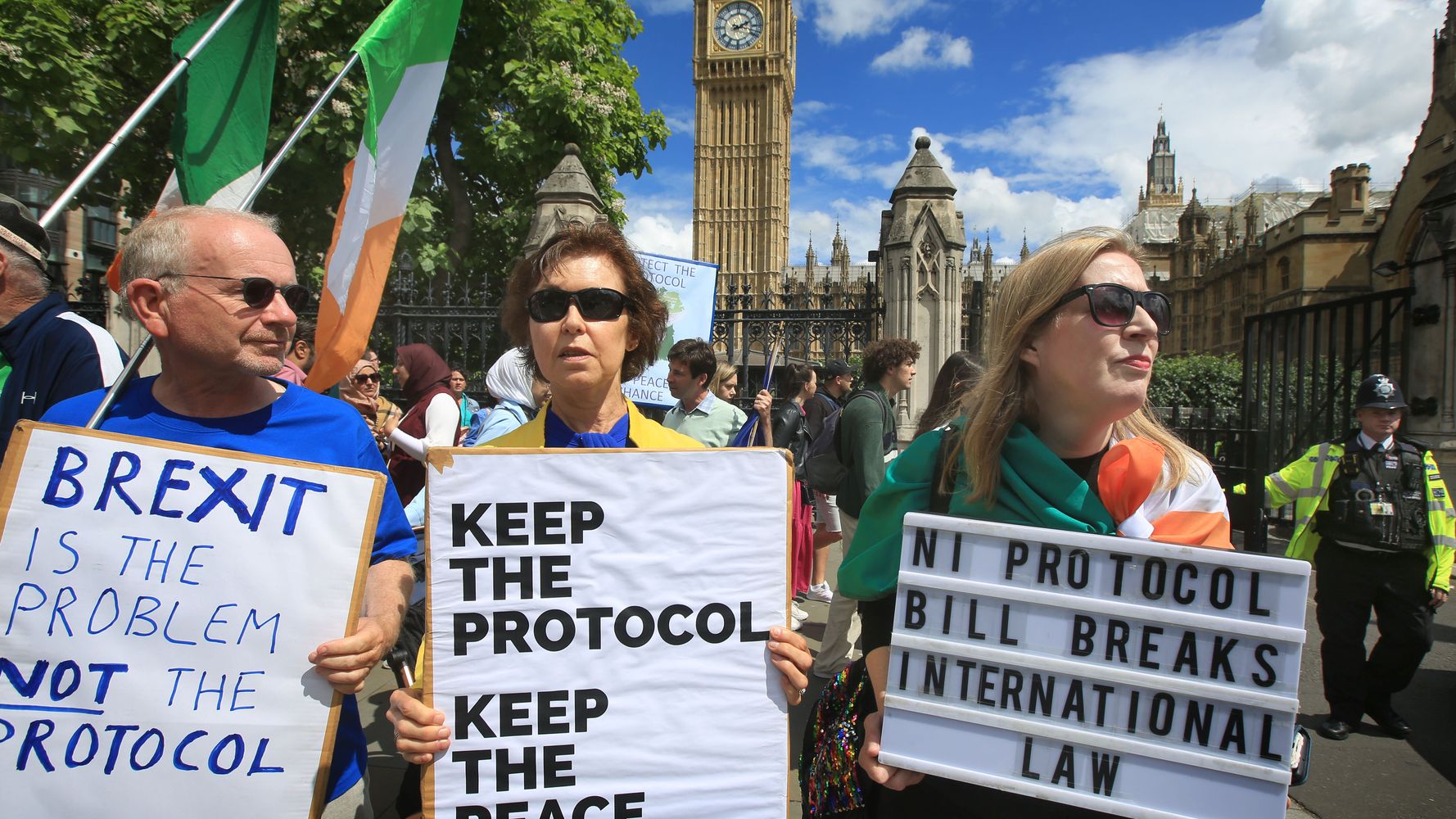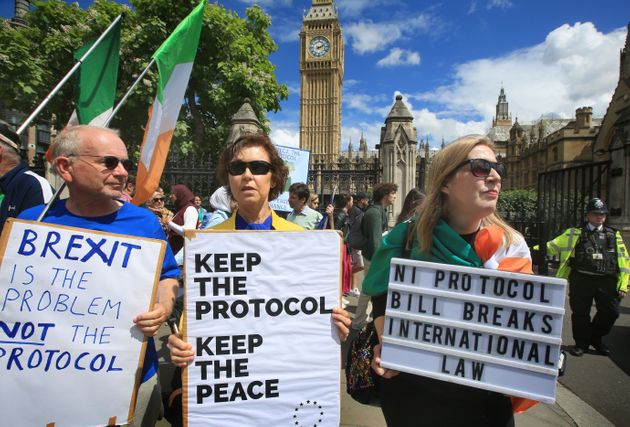
After months of impasse over the Northern Ireland protocol, Rishi Sunak is finally preparing to present a new deal to parliament that could be the defining moment of his premiership.
The prime minister holding talks with European Commission president Ursula von der Leyen to put the final touches to the new arrangements.
Advertisement
While it is not yet known what is in the deal, there are a number of key issues that Sunak has sought to address — including ticking his “three boxes” of sovereignty for Northern Ireland, safeguarding its place in the Union and easing disruption for people and businesses.
However, while Sunak and the EU may now be on the same page, it is not guaranteed that everyone in the Tory Party, and the Democratic Unionist Party, will be on board.
Here HuffPost UK takes you through what could be in Sunak’s deal and what the key sticking points are.
The protocol is a trading arrangement, negotiated during Brexit talks, that allows goods to be transported across the border between Northern Ireland and Ireland without the need for customs checks.
Advertisement
The deal was aimed at protecting the delicate Good Friday Agreement by avoiding putting up a hard border between NI and the Republic.
However, unionist parties argue that the protocol instead places an effective border in the Irish Sea, undermining Northern Ireland’s place within the UK.
Goods moving from GB to NI currently have to undergo vigorous checks because they may end up in the Republic of Ireland, which remains in the EU’s single market. That has created friction and disruption for businesses which the UK and EU both want to solve.
The protocol is so disliked by the DUP, Northern Ireland’s largest unionist party, that it has refused to take part in the power-sharing government with Sinn Fein at Stormont unless its concerns are resolved.
What are the main the problems with the protocol?
Unionists are concerned about the disruption to trade that has resulted from checks at Northern Ireland’s ports, as well as the fact that the country is being treated differently from the rest of the UK — something they regard as unacceptable.
Advertisement
Alongside that, unionists do not like that Northern Ireland has to follow some EU rules, without having a say on how those rules work. They call this the “democratic deficit”.
A particular gripe for Brexiteers and unionists is the role that the European Court of Justice (ECJ) plays in solving potential disputes in Northern Ireland.
While the protocol has created an economic advantage for Northern Ireland in that it can sell both within the UK internal market and into the EU single market, because it has to follow some EU laws, it also falls under the jurisdiction of the ECJ.
Put simply, the DUP want the ECJ’s influence in Northern Ireland removed entirely.
What changes could there be?
Sunak is understood to have negotiated a new arrangement to avoid customs checks on the vast majority of goods travelling between Britain and Northern Ireland.
The new deal is expected to see the creation of “green” and “red” lanes.
Goods that are only destined for Northern Ireland will enter ports via the green lane and be subject to minimal checks. Those that are due to end up in the Republic of Ireland will go through the red lane and will have to undergo full EU checks.
Advertisement
While Brexiteers and unionists want Northern Ireland to be free from the ECJ, for the EU its role is a red line — if the region is to enjoy the perks of being in the single market then it must abide by the rules like other EU member states.
The compromise that could be achieved is a reduced and minimal role for the ECJ.
Deputy prime minister Dominic Raab said the reduction in trade red tape would lead to a “substantial scaling back” of the role of the ECJ — but he did refuse to rule out the court having a say on future legal cases, which could prove unpalatable to the DUP.
According to the Times, the deal could ensure that Brussels would have to notify Britain if it intends to apply any future regulations to Northern Ireland, which it could raise objections to.
The Speaker of the Northern Ireland Assembly may also be able to delay any potential regulation by having the power to put it to a vote.
The newspaper reports that if there are any disputes over the application of EU law in Northern Ireland, the region’s courts would consider it first and then decide whether to refer the issue to the ECJ.
Advertisement
Will MPs back the deal?
The groups that Sunak needs to woo the hardest include the Brexiteers in the European Research Group (ERG) and the DUP — who want the complete eradication of EU law from Northern Ireland.
ERG chairman Mark Francois yesterday warned that the agreement must mean an end to EU laws being imposed on Northern Ireland and that there simply being “less of a role” for the ECJ was “not good enough”.
The Conservative former minister told Sky News’ Sophy Ridge: “What we want is a situation where EU law is expunged from Northern Ireland, so it is treated on the same basis as England, Scotland and Wales.”
Asked whether he would therefore not back any deal if the ECJ has any role in it, he said: “We have left the European Union. It doesn’t have that role now in England or in Scotland or in Wales.
“So, if we’re going to treat Northern Ireland as an integral part of the United Kingdom, then we have to get rid of the EU law in Northern Ireland. We’ve been absolutely consistent on this.”
Advertisement
The DUP has issued seven tests Sunak must meet if it is to back the deal, including that the people of Northern Ireland are given a say on the laws that affect them, that there are no checks moving between GB and NI and vice versa, and that there must be no border in the Irish Sea.
The DUP has also made it clear that it wants to see the text of the new legal framework — something the prime minister has not yet agreed to.
While Sunak promised that parliament would be allowed to “express its view” on the deal, it is not yet clear whether that will translate into a parliamentary vote.
However, if there is one, Sunak will want to avoid the scenes we saw under Theresa May — where there was deadlock in the Commons Chamber.
Opinion is divided over how important the DUP’s approval is — former Cabinet minister Jacob Rees-Mogg said the scale of any potential revolt against Sunak would “depend on the DUP”.
Advertisement
“If the DUP are against it, I think there will be quite a significant number of Conservatives who are unhappy,” he told GB News.
However, while Sunak will hope to the get the ERG and DUP on board, because Labour has said it will vote with the government in favour of the deal, he may be able to do it without them.





